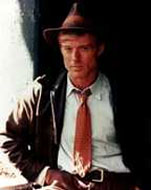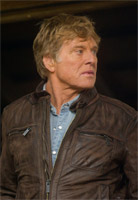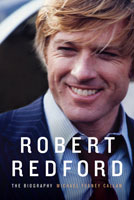Cate Blanchett Truth
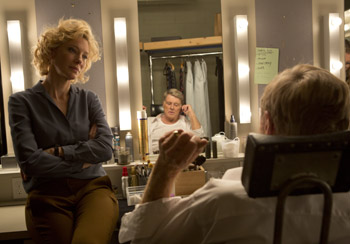
Cate Blanchett Truth
Cast: Cate Blanchett, Robert Redford
Director: James Vanderbilt
Genre: Biography, Drama
Rated: M
Running Time: 125 minutes
Synopsis: Told from the perspective of the veteran journalist at the center of the controversy, Truth examines how a news report of national importance was fitted together piece by piece in the newsroom, only to be unraveled by a storm of accusation and criticism. Truth is based on the memoir Truth and Duty: the Press, the President, and the Privilege of Power by Mary Mapes.
June – September 2004
CBS News producer Mary Mapes (Cate Blanchett) is on a career roll in mid-2004 when she turns her focus to then-President Bush's service in the Texas Air National Guard. In April she had produced (and would later win a Peabody Award for) the 60 Minutes segment that broke the Abu Ghraib story of torture at the military prison in Iraq.
Based in Dallas, where she lives with her supportive husband, Mark Wrolstad (John Benjamin Hickey) and precocious seven-year-old son Robert (Connor Burke), Mapes moves easily from home to field to CBS News headquarters in New York. She's at the top of her game, finding and tracking down the stories she'll produce, managing the staffing, research, and editing. She has worked closely with veteran CBS anchor Dan Rather (Robert Redford) for years, and the two share mutual respect and affection.
Josh Howard (David Lyons) is the Executive Producer at 60 Minutes II, the Wednesday evening edition of the longtime news hour. Howard and Senior Broadcast Producer Mary Murphy (Natalie Saleeba) are intrigued when Mapes describes rumors about George W. Bush's National Guard service during the Vietnam War era, a story that other news organizations are also pursuing. The senior producers give her the green light to run down her leads.
The Mapes Team
She assembles her investigative team: Lt. Col. ROGER CHARLES (Dennis Quaid) is a straight-arrow military consultant who worked with Mapes on the Abu Ghraib story; Lucy Scott (Elisabeth Moss) is a journalism professor from Dallas and a tireless researcher; Mike Smith (Topher Grace) is a Texas-based freelancer who has worked with Mapes and sends her the occasional tip. The team plows through their dogged 'Bush-Guard" investigation, as it's nicknamed, against the looming backdrop of the Bush vs. Kerry Presidential elections, thick with heightened partisan acrimony.
The Bush-Guard Timeline
Poring through the official records of Bush's Guard duty (which the Mapes team suspects is incomplete and possibly altered) they piece together a timeline: from May 1968 to the spring of 1972, Bush performed well in the Guard, first at pilot training at Moody Air Force Base in Georgia, then in the 111th Fighter Intercept Squadron in Houston. But in 1972, Lt. Bush was suspended in writing for missing a routine physical. He had left his unit months earlier and had been granted reassignment to Alabama, where he was supposed to have been working on a Senate campaign being run by a friend of his father's. During the period May 1972 to May 1973, the team finds no record of Bush ever showing up at the Alabama Guard base"no paperwork,or eyewitness recollections to confirm his active duty. In September of 1973, Lt. Bush requested and was granted early discharge so he could attend Harvard Business School.
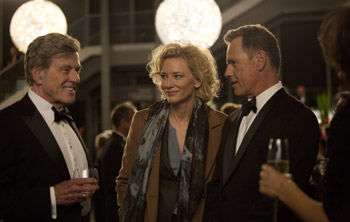 Mapes believes she has a solid starting point: former Texas Lieutenant Governor Ben Barnes (Philip Quast), a colorful, larger-than-life politico, who allegedly has regaled friends and dinner guests for years with an off-the-record anecdote about how back in 1968, when Barnes was Speaker of the Texas House, he was asked to make a phone call or two to help young George W. Bush get into the Texas National Guard.
Mapes believes she has a solid starting point: former Texas Lieutenant Governor Ben Barnes (Philip Quast), a colorful, larger-than-life politico, who allegedly has regaled friends and dinner guests for years with an off-the-record anecdote about how back in 1968, when Barnes was Speaker of the Texas House, he was asked to make a phone call or two to help young George W. Bush get into the Texas National Guard. Mapes calls Ben Barnes to try to convince him to reveal his Bush-Guard nepotism story on camera for the record, but Barnes refuses"he'd be 'run out of Austin on a rail." The team doggedly works through a long contact list of officers and commanders who might have some recollection of Bush's service, but each and every phone call meets the same brush-off: 'No strings were pulled!"
The Killian Documents
Then, a major break for the Mapes team: never-before-seen documents are rumored to have surfaced, supposedly proving the Bush-Guard no-show story. Mapes assigns Smith to track down Bill Burkett (Stacy Keach), a rancher and former Texas Army National Guard lieutenant colonel, who claims to be in possession of the documents. Mapes and Smith meet Burkett and his worried wife, Nicki (Noni Hazelhurst); Burkett is in ill health, and Nicki frets for their safety if word ever gets out that Bill is the source of the documents. But Mary convinces them that only a heavyweight broadcast news show of 60 Minutes' stature has the credibility to tell their story, and she promises to protect their anonymity. They hand over the documents, which are copies, not originals; Burkett refuses to name his source.
The 'Killian documents," as they become known, appear to be signed by Lt. Col. Jerry B. Killian, the now-deceased commanding officer of the 111th Fighter Intercept Squadron during G.W. Bush's time there; they seem to corroborate the story that Bush ceased fulfilling his Texas Air National Guard duties. Another document (that comes to 60 Minutes from Burkett after their initial meeting) is titled 'CYA" (as in Cover Your Ass) and seems to have been written by Killian for insertion in his own files as a statement of record that he was pressured by higher-ups to give Bush a favorable performance rating when he wasn't even on base. Together, the documents appear to offer compelling evidence that Bush was allowed to shirk his duty.
Four independent document examiners are asked to analyze the Killian memos for authenticity, but the documents are copies, so no examiner can authenticate them with certainty by determining the age of the paper or ink. Document analyst Marcel Matley (Nicholas Hope) comes to New York to review the new documents in comparison to those already released by the White House. He believes the Killian signatures on some of the documents provided by Burkett to match Killian's signatures on some of the documents in the official record. He sees no problem with the construction or format of the documents. Mapes and her team are confident that they have done due diligence and the documents from Burkett are worthy of presentation to the public.
Countdown to the Broadcast
While Mapes and her team have been piecing together the story, Dan Rather has been updated and consulted along the way. He still wants more solid evidence before he'll consider taking the Bush-Guard story on the air.
Now, events begin to click with more urgency. Mike Smith locates a video clip of Texas Lt. Governor Ben Barnes at a Democratic fundraiser, amusing the crowd with his well-worn anecdote about getting George W. Bush his spot in the Texas Guard. Barnes, who didn't know his speech was being taped, concedes that he may as well come on camera and fess up.
The producers are faced with a tough choice: due to network scheduling, their available air dates are either weeks away"by which time somebody else may well have broken the Bush-Guard story"or a mere five days away. It's also important to them to avoid unduly influencing the November election with a last-minute 'October surprise," so they opt for the earlier date. Mapes believes she can bring it in under the wire, and the show is scheduled for September 8th. As Mapes' memoir recounts, another major breakthrough happens just two days before the broadcast, when Mapes is finally able to get through on the phone to Major General Robert Hodges, who was Jerry Killian's immediate superior during the '72-'73 period documented in the Killian memos. With Roger Charles also listening on the phone, Mapes reads Hodges the content of the memos; as she recounts it, Hodges corroborates that they indeed represent Killian's feelings about George W. Bush at the time. The 60 Minutes team believes that their case is airtight.
Air Time, September 8, 2004
The broadcast takes shape as Rather and Mapes tie the pieces together: it includes Rather's interviews with Marcel Matley, Ben Barnes, and Robert Strong (Martin Sacks), a former Texas Air National Guard administrator who denounces the cronyism and corruption of the Vietnam-era Guard. The team is editing down to the last moments before air time, shaving off seconds, and much of the nuts-and-bolts authentication about the documents"important but undramatic"is cut for time.
The show that airs, however, is anything but undramatic. Rather guides the narrative from Barnes' remorseful confession that strings were indeed pulled, by him personally, to Strong's contempt for the Guard's corruption in that era, to the seemingly damning evidence of the Killian memos, making a case that George W. Bush did not fulfill his military duties.
The Blowback
The morning-after triumph and congratulations are short-lived. Within hours, the conservative blogosphere is declaring the documents forgeries and denouncing the 60 Minutes report as liberal lies. Bloggers tear apart the physical evidence of the memos' formatting, typescripts, kerning, and spacing, claiming that they could not have been produced by -70s-era typewriters, and must have been whipped up on a computerized keyboard.
It's not long before the mainstream media are jumping on the story-about-the-story, opining about whether the 60 Minutes reporting was malicious or merely slapdash. Lost in the din about keystrokes is the question of President George W. Bush's military service record.
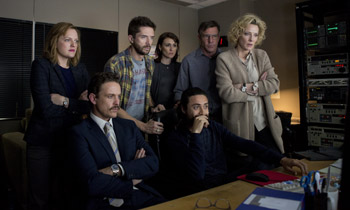 While the CBS executives"Josh Howard, CBS senior vice-president Betsy West (Rachael Blake), CBS public relations chief Gil Schwartz (Steve Bastoni) and CBS News president Andrew Heyward (Bruce Greenwood)"monitor the situation with growing alarm, Mapes goes back over her trail to reconfirm every assertion in the story. Dan Rather, who has faced take-downs before and expects to come through this one unbowed, maintains his cool.
While the CBS executives"Josh Howard, CBS senior vice-president Betsy West (Rachael Blake), CBS public relations chief Gil Schwartz (Steve Bastoni) and CBS News president Andrew Heyward (Bruce Greenwood)"monitor the situation with growing alarm, Mapes goes back over her trail to reconfirm every assertion in the story. Dan Rather, who has faced take-downs before and expects to come through this one unbowed, maintains his cool. Mapes and Rather assemble a point-by-point rebuttal that airs on the CBS Evening News, using the footage of examiner Marcel Matley that was cut from the original piece and a new interview, in which Matley explains that the charges of forgery are based on copies of copies and faxes of faxes of the Killian documents"copies that could undergo subtle font and format changes at every step.
Mystery Sources
The CBS executives tell Mapes they need to speak privately with her anonymous document source. On a conference call with Andrew Heyward, Mapes, and Rather, Bill Burkett relates a tale about where he got the Killian documents"but it's a story that completely contradicts what he told Mapes. He lied to Mapes, he states, just to get her off his back. In his new version, anonymous whistleblowers contacted him to copy and disseminate the documents and then burn the originals.
The bizarre tale is a bombshell"but Rather calmly convinces Burkett to clear the air on camera, to set the record straight and be done with it. Burkett agrees, and submits to a difficult questioning on tape.
With CBS now in a defensive crouch, as Rather sympathetically informs Mapes, he has been told to go on the air and apologize for using the now-discredited documents. The Bush-Guard story is dead. CBS is appointing an independent panel to review the entire fiasco. Mapes later watches sadly as her friend and mentor Rather admits his own presumed failings on the air, a tragic coda to their years of tireless investigation and collaboration.
An Independent Investigation
Mapes hires her own attorney, Dick Hibey (Andrew McFarlane), who will represent her before the panel convened by CBS and co-chaired by Richard Thornburgh (Helmut Bakaitis), who was formerly U.S. Attorney General under President George H.W. Bush. The other co-chair, Lou Boccardi (Lewis Fitz-Gerald), is the former CEO of the Associated Press.
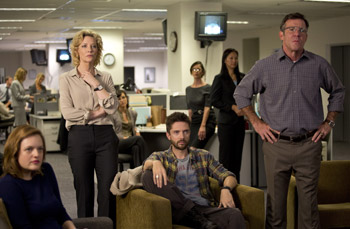 Attorney Hibey advises Mapes to cooperate in every way, to tell her side of the story in every detail, to avoid antagonizing the panel as much as possible. She answers questions, keeps her cool, and waits a month before the panel reconvenes after the November election.
Attorney Hibey advises Mapes to cooperate in every way, to tell her side of the story in every detail, to avoid antagonizing the panel as much as possible. She answers questions, keeps her cool, and waits a month before the panel reconvenes after the November election. In exile from CBS, awaiting her second appearance before the panel, at home in Dallas, Mapes hears more saddening news from her old friend Rather. He has agreed to step down as anchor of the CBS Evening News after George W. Bush's second inauguration. 'Hold your head up," he tells her.
When Mapes appears before the reconvened panel, her lawyer thinks she has performed well" perhaps she might be able to hang onto her job after all. But the feisty, combative side of Mapes is unleashed, and she can't refrain from asking 'Aren't you going to ask me about my politics?"
With that question, Mapes implicitly accuses the panel of politicizing the investigation. She may well have sealed her own fate, but Mapes has spoken her own truth.
In January 2005, on the day the panel report is released, Mapes is terminated from CBS. In his stirring final broadcast, Dan Rather invokes the public trust in journalism's quest for truth, and closes his farewell with his trademark 'Courage."
Truth
Release Date: December 3rd, 2015
About The Production
Who's Who in Truth
The cast of characters referenced in Truth includes the following, described by Mary Mapes' memoir as they were during the film's 2004 timeframe:
The 60 Minutes II Staff
Dan Rather was associated with CBS News for four decades and was anchor of the CBS Evening News for 24 years, from 1981 to 2005.
Mary Mapes was a producer at CBS News and a close collaborator with Dan Rather for fifteen years. She won a Peabody Award in 2005 for producing the CBS News segment that broke the Abu Ghraib Iraq military prison abuse story.
Andrew Heyward was President of CBS News from 1996 to 2005.
Josh Howard was the executive producer of the 60 Minutes II Wednesday edition of 60 Minutes. Howard had a prior two-decade career at CBS.
Betsy West was senior vice president at CBS News from 1998-2005; she oversaw 60 Minutes and 48 Hours.
Mary Murphy was a senior broadcast producer at 60 Minutes II.
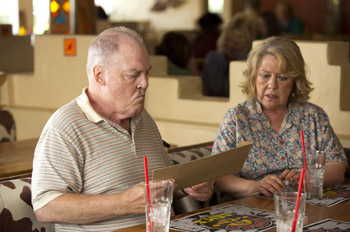 Mapes' Investigative Team
Mapes' Investigative Team
Lt. Col. Roger Charles was a Marine Corps Vietnam veteran who worked with 60 Minutes and CBS News as a military consultant and investigator. He was closely involved with breaking the Abu Ghraib story.
Mike Smith was a freelance journalist and researcher who had worked with Mapes and had been following the Bush-Guard story for years.
Lucy Scott was a journalism professor and freelance researcher who worked as an associate producer on the Bush-Guard story.
The Bush-Guard Story Contacts
Ben Barnes was Speaker of the Texas State House at the time of George W. Bush's entry into the Texas National Guard in 1968. Barnes was Lt. Governor of Texas from 1969-1973.
Bill Burkett was a Texas rancher and retired Lt. Colonel in the Texas Army National Guard. He was the source of the Killian documents.
Lt. Col. Jerry B. Killian, deceased at the time of the Truth story line, was George W. Bush's commanding officer in the 111th Fighter Interceptor Squad in Houston.
Maj. Gen. Robert Hodges was a former Texas Air National Guard commander who was Killian's immediate superior.
Robert Strong was a Texas Air National Guard administrator in Austin at the time of G.W. Bush's Guard service.
The Independent Panel
Richard Thornburgh co-chaired the panel. Thornburgh served as U.S. Attorney General under President George H.W. Bush from 1988 to 1991.
Lou Boccardi co-chaired the panel with Thornburgh. He was President and Chief Executive Officer of The Associated Press (AP) from 1985 until his retirement in 2003.
Richard Hibey was Mary Mapes' attorney during her appearance before the panel.
Production Notes
Truth is a classic newsroom drama, a suspenseful behind-the-scenes procedural, a multicharacter study"and also something more: In the words of former CBS News anchor Dan Rather, 'This film is about what has happened to the reporting of news, how and why it's happened, and why you should care."
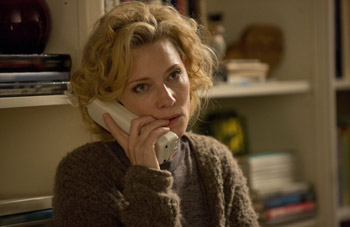 For Writer-Director James Vanderbilt, a fascination with journalism initially drew him to the project. 'Movie making and journalism are different ways of telling a story. I grew up with All the President's Men and wrote and co-produced Zodiac, about the San Francisco Chronicle, and I've always been intrigued with what goes on in newsrooms. When a big story breaks on 60 Minutes, how does that happen? How does the sausage get made?"
For Writer-Director James Vanderbilt, a fascination with journalism initially drew him to the project. 'Movie making and journalism are different ways of telling a story. I grew up with All the President's Men and wrote and co-produced Zodiac, about the San Francisco Chronicle, and I've always been intrigued with what goes on in newsrooms. When a big story breaks on 60 Minutes, how does that happen? How does the sausage get made?"
Back in 2005, Vanderbilt, who makes his directorial debut with Truth, came upon an advance excerpt in Vanity Fair of Mary Mapes' memoir Truth and Duty: the Press, the President, and the Privilege of Power. The memoir recounts, in blow-by-blow detail, Mapes' investigative work as producer of the controversial 60 Minutes II piece on then-President George W. Bush's service in the Texas Air National Guard, and the subsequent firestorm of accusation that shredded the story's credibility and ultimately led to the firing of Mapes and the forced resignation of Rather.
'I was about as aware as anybody else of the CBS scandal, but when I read the piece, I saw I clearly didn't know a lot about what actually happened behind the scenes. Cinematically, I imagined being taken behind the curtain of what that world is like, and being able to experience it through the eyes of veteran journalists who flew so high and fell so far."
Vanderbilt and his Mythology Entertainment partner, Producer Brad Fischer, acquired the rights to Mapes' memoir and began speaking to the then-disgraced former news producer about adapting it to the screen. Having previously worked together as producers of the fact-based David Fincher film, ZODIAC, the pair was familiar with the challenges of making a movie that delved into a traumatic period in the lives of real people/ 'Mary was reticent at first," recalls Vanderbilt, 'But I asked if it would be OK to come down to Texas for a few days. We talked about everything but what had happened. We talked about our favorite movies, we talked about her history, my history, everything but the incident, and at the end she was comfortable enough to move forward."
'I trusted Jamie not to turn it into something it wasn't," says Mapes. 'I liked his screenplay, and we went back and forth on details, but I honestly believed for all these many years that it probably was never going to happen." Although Mapes no longer works in broadcast journalism, she has moved on with her career as a writer and consultant.
Nailing the details
For Vanderbilt and Fischer, accuracy was critical. 'I knew Mary's book was a really good jumping off point in terms of her view of things," says Vanderbilt, 'But, especially in something that's contentious, there are going to be many sides to the story. I really wanted to do the homework as much as I could. I talked to a lot of people who were involved, not all of whom were sympathetic to Mary's cause. I spoke to Dan and Mary, Mike Smith, Roger Charles, Josh Howard and a lot of people. I went back to the method of trying to double-source everything we put in the movie."
When asked about the accuracy of Vanderbilt's screenplay and Truth, Dan Rather asserts, 'It's not just pretty accurate, it's astonishingly accurate."
Mapes recalls, 'Dan said -I think it is the best thing I've ever seen on the craft of journalism,' meaning: -You go get this. I'll get this. You try to get this. We have to get this. What did you get?' How you take all those disparate pieces and you put it together into a puzzle where a picture forms and then you go out and tell people, -Look at the picture.' At CBS, we had really good, smart, strong people working in so many different areas on pulling stories together, people who believed it was important."
Capturing the blur and intensity of a newsroom under deadline, says Vanderbilt, 'was like a submarine movie"you've got this ragtag bunch of people in the sardine can together, and they're spouting their own specialized arcane language, but the movie doesn't stop to explain all that"you just go with it."
Linchpin casting
With the screenplay in solid shape, the Mythology partners took a shot at their dream casting for the central role of Mapes. 'Cate Blanchett was at the very top of our list," says Fischer, 'But we went to her at what one would assume would be the worst possible moment"just as she had won the Best Actress Oscar for Blue Jasmine. She was being offered everything under the sun, and here was Jamie, a first-time director. But we could make the case that if Cate responded to the script"as she did, strongly"she was responding to the vision that Jamie would bring to directing."
'I usually read scripts very slowly," recalls Blanchett, 'but I read Jamie's Truth script in one sitting. Once you get on it's like a freight train, and I think that must have been the experience for the actual real-life protagonists in the story. I was gripped by it."
With Blanchett on board, the filmmakers knew precisely where to turn for their big-screen portrayal of a small-screen icon. 'The big trick of casting this movie was Dan Rather," recalls Vanderbilt. 'If you grew up in America hearing his voice, it's part of your history. When Dan walks into a room, he becomes the center of gravity. So we needed someone with that same gravitational pull. We needed a legend to play a legend."
As Robert Redford remembers it, 'I thought, I've got to deliver the essence of the guy without doing a caricature. He's a very orderly, proper fellow; he has a dark underpinning that wants to dig in, and he doesn't mind if he unsettles things, but on the surface he is a very dignified, old-fashioned, polite guy." Redford and Rather had been acquaintances since working together on an environmental news story for 60 Minutes in the 1970s. 'A way of getting at the essence of Rather," says Redford, 'was to develop the relationship between him and Mary Mapes, as played by Cate. Their loyalty was at the core of the film."
There can be few experiences in life quite like discovering that one will be played by the likes of Cate Blanchett or Robert Redford. Mary Mapes and Dan Rather were together on a conference call with Vanderbilt and Fischer when they heard the news. 'Humbling," says Rather.
'Flabbergasted," says Mapes. 'We were speechless, and that never happens!"
Later, Rather recalls, 'when I walked onto the set, I was floored at how closely Cate resembled Mary, not just her hair and clothes but her mannerisms, her walk, her vocal delivery."
Likewise, 'it was unnerving to me how Redford captured these small things about Dan," says Mapes. 'The way he stands, the way he moves his head, the way his back looks with those ever-present suspenders. This real gravitas and vulnerability."
Blanchett had done web research and studied interview videos of Mapes from her memoir book tour before meeting her in person. 'I was horrified by the personal attacks against Mary. It was really the advent of the blogosphere, and to witness someone's fall from grace via these so-called Internet reports was chilling. In the videos, she's very armored up and defensive. Then to meet in person this vivacious, vital, positive, searingly intelligent woman with her incredible sense of humor"that was amazing. I hope I've found a small window in the freight train of the story to try to bring the real-life Mary's vivacity into the piece."
Blanchett also played a behind-the-scenes role in Truth that helped bring an added benefit: a crack Australian production team that delivered under tight constraints of time and money. Her Dirty Films production company was instrumental in working with the New South Wales Film & Television Office.
No Villains
Truth has a rich line-up of character roles and a stellar ensemble of heavy-hitting actors bringing them to life, including Topher Grace, Elisabeth Moss, and Dennis Quaid as the investigative researchers working with Mapes, Stacy Keach as an anxious informant, and a dream cast of allies and antagonists surrounding the central pair.
'I never wanted to treat any characters as villains," explains Vanderbilt. 'There's a version of the movie we could have made about all these bad corporate guys who don't care about journalism, but I don't think that's how the world works. Everybody is trying to do the best job they can in a crisis. We needed great actors who could play those nuances. "
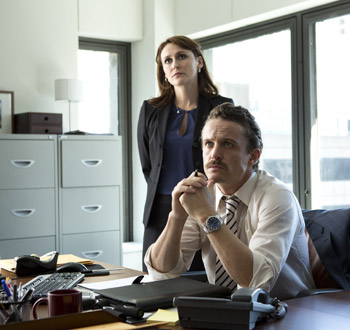 Redford talks about the delicate business of real lives intersecting with screen lives: 'I said -Look, Dan. I'm going to be playing you. This is tricky. Would you like to tell me anything? From your point of view, can you tell me what this was really about?' And he said, -Yes, it was about loyalty. It was a tripod loyalty to my partner and producer, Mary Mapes, my boss, CBS, and myself. It was all equal. I was equally loyal to CBS, my boss, and equally loyal to my compatriot.'"
Redford talks about the delicate business of real lives intersecting with screen lives: 'I said -Look, Dan. I'm going to be playing you. This is tricky. Would you like to tell me anything? From your point of view, can you tell me what this was really about?' And he said, -Yes, it was about loyalty. It was a tripod loyalty to my partner and producer, Mary Mapes, my boss, CBS, and myself. It was all equal. I was equally loyal to CBS, my boss, and equally loyal to my compatriot.'"
The Church Of CBS
Rather speaks of 'the CBS ethos of loyalty"the institution standing behind our reporting from the Edward R. Murrow era to civil rights to Vietnam to Abu Ghraib, our whole long history and tradition of questioning power. I loved what CBS News had stood for through more than half a century"and still do."
'It was the church of CBS," says Mapes. 'I had joined the order. I really believed in the organization. I believed in journalism and the purity and importance of that kind of work. I believed that I had been lucky enough to get the best job in the world. To work with Dan was an incredible honor. Before he became a friend, someone I could tease mercilessly, I had admired him all of my adult life, and to work with him was just an incredible, as we say in Texas, blessing." Inspired by the 'church of CBS" ethos, Vanderbilt and composer Brian Tyler aimed for an almost devotional quality in the music behind the key montage of Americans watching the 60 Minutes II report on President George W. Bush's Texas Air National Guard service.
'For the journalists," says Vanderbilt, 'This is their moment"we've done all this work, all the research, and now we press play and it goes out all over the country and people can watch and learn. It's the moment we've been waiting for. I wanted that montage scene to feel different, because if this were any other movie, this would be the end of the movie"job well done, The End. But instead it's the dividing line between building up and tearing down, before and after."
Questioning Power
Within that triumph-to-downfall arc, the unbroken bond of respect and affection between Mapes and Rather underlies Truth's emotional trajectory. 'It's almost a father-daughter relationship," says Vanderbilt.
'There's very much an underpinning of truth to that," says Mapes. 'I do think Dan and I share a certain perspective about injustice. I grew up with an authority figure who was unfair and abusive, and so I had a mindset that it is possible for people to abuse their authority and to hurt underdogs. In any context I am much more interested in the stories of people who were not born at the top of the pile, who didn't have all the advantages in the world. I was interested in exposing hypocrisies and inequity in our lives and society. Dan shares that ethic"as a journalist that's what you are supposed to do. You are supposed to hold the powerful to account to the same standards the rest of us live by. We got slammed and cut adrift for that."
Says Rather, 'Our form of government is supposed to be for the people, by the people, of the people, and it only works if people know what is really going on. That is the mission of a journalist"to find out and report what those in power don't want you to know, what they want to keep hidden. That's only possible when journalists can operate within a system that supports independence and integrity."
Vanderbilt muses, 'We've gone from being a country where disagreement is okay to outrage when someone has a different point of view, people screaming at each other. This period in journalism, a decade ago, is fascinating"it's right at that tipping point of discovering how the Internet works, how fast, how responsive. How forces can line up to divide us as a country. Doing the movie was never about proving Mapes and Rather were right or wrong about the story. Just like All The President's Men isn't about Richard Nixon, this movie is not about George W. Bush."
As Dan Rather explains it, 'I feel no need for validation or redemption. I am what my record is, a long one with pluses and minuses, ups and downs, and a lot in between. I have a passion for what I do professionally, always have, still do. But if our story can help even one journalist to stand up against interference and intimidation, if it can help even one viewer understand how important real news is, if it helps even one voter to elect those who will protect democracy and protect journalism from those who would poison it, it is worth it all."
Quotes And References
You cannot have a constitutional republic based on the principles of freedom and democracy without truth in news, because an informed citizenry is imperative. Freedom and democracy get wiped out if truly independent"fiercely independent when necessary"journalism gets wiped out. And it didn't just get wiped out on the Bush National Guard story on my watch. It is getting wiped out every single night, right down the street in newsrooms both network and local in cities all across America now. - Dan Rather, August 2015
During Vietnam, it took long years for reporters to realize they were being lied to"that the reasons for the war were overblown, unfounded and untrue. In the decade following 9/11, reporting was arguably worse. Journalists were afraid to ask hard questions. Too many were terrified of being labeled as 'liberal" by the right wing attack machine. Too many feared that questioning the 'war on terror" meant aligning themselves with terrorists. Too many looked the other way, rather than risk angering a White House that had no reservations about seeking revenge. - Mary Mapes, August 2015
'It's ironic that the blogs were actually wrong when they had their criticism," Missal said in a speech back in March at Washington and Lee's law school. 'We actually did find typewriters that did have the superscripts, did have proportional spacing, and on the fonts, given that these are copies, it's really hard to say," Missal said. 'But there were some typewriters that looked like they could have some similar fonts there, so the initial concerns didn't seem as though they would hold up." - Michael J. Missal, Esq., Lead Counsel to the Independent Review Panel for CBS, and principal author of the Jan. 5, 2005 Panel Report, quoted in an NPR Morning Edition piece, 'Dan Rather Hopes to Tell His Bush Story in Court" Dec. 23, 2008 http://www.npr.org/templates/story/story.php?storyId=98451972
There has been comment upon my contribution to Democrats like Senator Kerry. Senator Kerry is a good man. I've known him for many years. But it happens that I vote for Viacom. Viacom is my life, and I do believe that a Republican administration is better for media companies than a Democratic one. - Sumner Redstone, Chairman of Viacom, in a Time magazine interview, '10 Questions for Sumner Redstone" Sept. 26, 2004. http://content.time.com/time/press_releases/article/0%2C8599%2C702106%2C00.html
Allison's account corroborates a Washington Post investigation in February that found no credible witnesses to the service in the Alabama National Guard that Bush maintains he performed, despite a lack of documentary evidence. Asked if she'd ever seen Bush in a uniform, Allison said: 'Good lord, no. I had no idea that the National Guard was involved in his life in any way." - Salon, 'George W. Bush's Missing Year" by Mary Jacoby, Sept. 2, 2004, quoting Linda Allison, widow of Jimmy Allison, Bush family confidant who employed G.W. Bush in the 1972 Winton Blount Alabama Senate campaign http://www.salon.com/2004/09/02/allison/
Truth
Release Date: December 3rd, 2015
Have You Seen This?
MORE
- Mission: Impossible Fallout
- Glenn Close The Wife
- Allison Chhorn Stanley's Mouth Interview
- Benicio Del Toro Sicario: Day of the Soldado
- Dame Judi Dench Tea With The Dames
- Sandra Bullock Ocean's 8
- Chris Pratt Jurassic World: Fallen Kingdom
- Claudia Sangiorgi Dalimore and Michelle Grace...
- Rachel McAdams Disobedience Interview
- Sebastián Lelio and Alessandro Nivola...
- Perri Cummings Trench Interview

